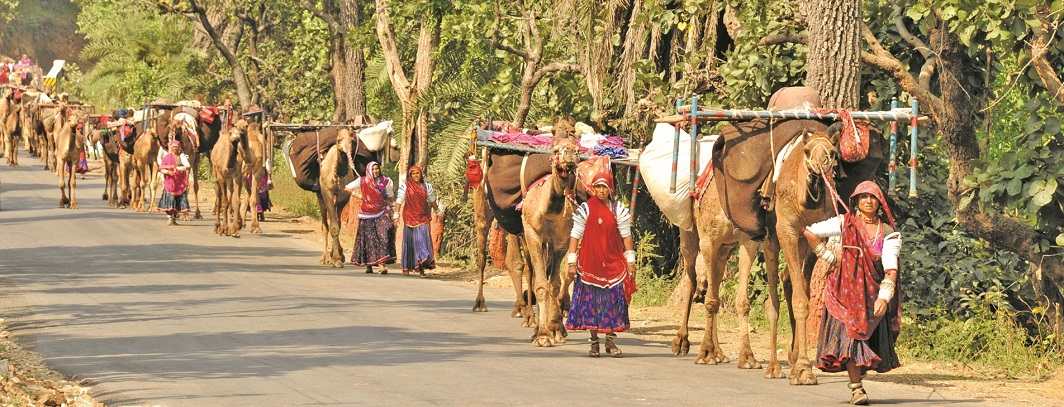The state’s judiciary has criticized its prohibition policy by pointing out numerous leakages. Decades of ban have only fuelled a multi-crore, black money spewing industry
~By RK Mishra in Gandhinagar
The Gujarat High Court’s recent observation that the liquor prohibition policy of Gujarat “has not yielded positive results’’ has had a sobering effect on the state government. The statement by Justice JB Pardiwala went on to say: “One may not find an open bar on a public street, but the number of cases, as on date, pending in the different Courts in the State of Gujarat, bears eloquent testimony to the fact that either the policy is not effective or something is wrong in the implementation of the law.”
He was hearing a case filed by liquor vendors of the union territory of Daman who have been booked in various FIRs filed by the Gujarat police. The cases the judge referred to lend enough weight to his observations. Only days earlier, on April 10, the state vigilance cell of the Gujarat police had seized a container carrying liquor worth around Rs 60 lakh being brought from Goa and on its way to the tribal districts of Panchmahals. The seizure was made near Vadodara.
A fortnight earlier on March 30, the Panchmahals police had similarly seized liquor worth another Rs 60 lakh on its way to the neighbouring tribal district of Dahod. The liquor in both the seizures was of the same brand and being brought from the same place, Goa. Interestingly the liquor consignments had travelled all the way from Goa through Maharashtra and were bound for areas in Gujarat which were contiguous with Madhya Pradesh and Rajasthan, states where it is freely available. Pricing and logistics clearly matter and that also shows how deeply entrenched the liquor mafia is in Gujarat.
Indeed, there is enough evidence to suggest that decades of prohibition have only fuelled a multi-crore, black money spewing industry of gigantic proportions with tentacles in numerous other areas like real estate and construction. Clearly, such a massive operation cannot run without the help of corrupt policemen and politicians.

In fact, Gujarat is the only state in the country where liquor prohibition has been in force since its inception. Permits for liquor consumption were considerably liberalised during Narendra Modi’s chief ministership. This was done to encourage tourism and make the state an attractive business destination. Permits on arrival are now available for anyone coming from outside the state, including group permits for business meets and conferences. Additionally, there are over 61,000 health permit holders in the state and the average daily consumption of alcohol by permit holders is worth around Rs 75 lakh per day in the state.
Interestingly, it was during Modi’s tenure that the state assembly passed a bill mandating severe punishment, including the death penalty, for bootleggers. This was after 150 people died after consuming spurious liquor in Ahmedabad in July 2009. It is an option that has never been put to the test.
Despite stringent laws on paper, liquor is a lucrative if clandestine business in Gujarat and according to one estimate, boasts a Rs 30,000 crore annual turnover. It has three components. At the bottom of the pyramid is the poor man’s drink—hooch or “lattha” as they call it in Gujarat. Then comes “desi”, the preferred tipple of rural Gujarat. The fruit liquor “mahua”, consumed by tribals falls in this category. For the urban rich and middle class in cities and towns (including the affluent class in rural areas), Indian Made Foreign Liquor (IMFL) as brewery made liquor is called, holds sway (Whisky, gin, rum, vodka, etc). Brewery liquor flows into the state from MP, Rajasthan, Maharashtra, Diu and Daman and, more recently, from Punjab and Haryana as well. One estimate puts the turnover of the illicit liquor trade in Ahmedabad alone at Rs 1,500 crore a year. Surat district alone consumes some 50,000 litres per day and almost 70 percent of the 18,000 plus villages in the state brew their own “desi”.
All major cities report high liquor consumption and rural areas are no exception either. No bootlegging business can be run without police connivance. According to one estimate, big time bootleggers pay roughly Rs 10 lakh a month as bribes. This is for brewery liquor. Over 60 percent goes to the Inspector in charge of the police station (there are two per police station). The remainder is divided among the lower ranks. Senior police officers are in the know, and take a cut, but if there is a crackdown, it is the inspectors who face the music.
There is occasional talk of doing away with prohibition but the fact remains that no political party or chief minister can dare to do so. The popular perception is that Gujarat is generally safe for unescorted women because there is prohibition. The reason is that most drinking is done in private, in homes or hotels. No one will risk drinking and going out in public, which makes it a win-win situation for all concerned. The politicians can boast about the state being safe for women thanks to prohibition, the police and bootleggers have a cosy, lucrative partnership, and for those who want a drink, it is just a phone call away.
It has taken a senior judge of the High Court to make public what the public knows; that the state’s prohibition policy is geared not to succeed.


